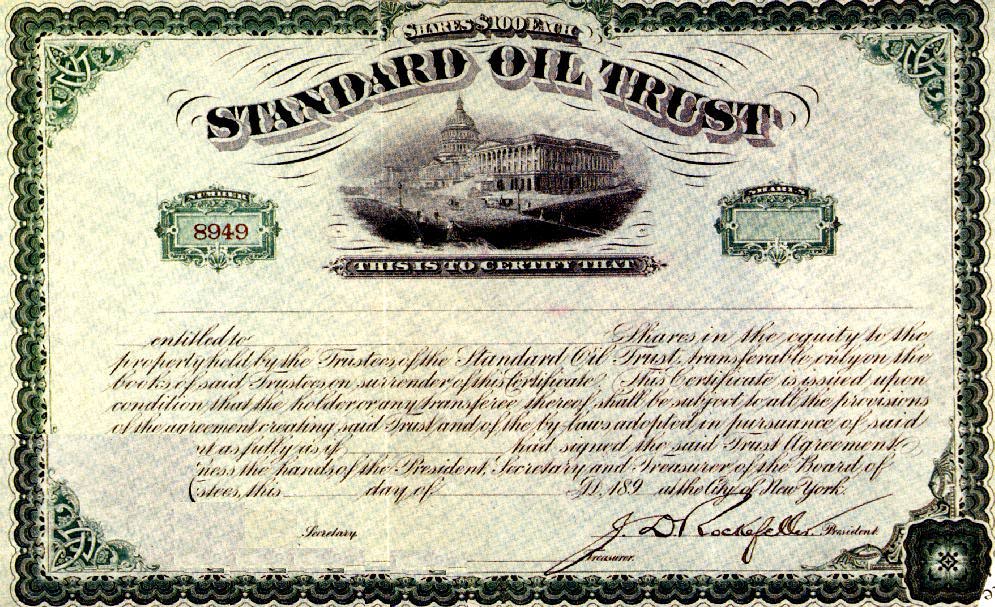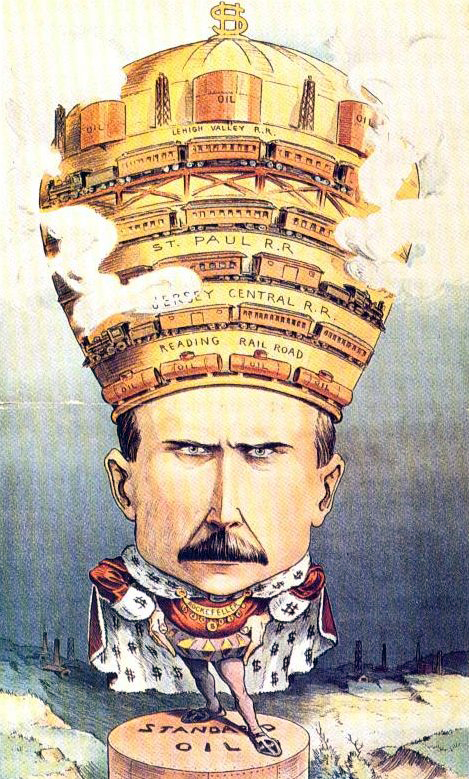Perhaps no individual in American history has achieved such meteoric heights as John D. Rockefeller, who embodies the image of the self-made man who rose from humble origins to become one of the richest and most powerful men in the world. He has also become the archetype of the ruthless capitalist, singlehandedly crushing competition and ignoring attempts to restrict or regulate his activities. Love him or hate him, his name casts a long shadow over the early 20th century.
Guest Henry Wiencek explores the deep contradictions and equally varied representations of John D. Rockefeller, the self-made millionaire whose name became synonymous with industry and free enterprise.
Guests
 Henry Alexander WiencekIndependent Scholar
Henry Alexander WiencekIndependent Scholar
Hosts
 Joan NeubergerProfessor of History, University of Texas at Austin
Joan NeubergerProfessor of History, University of Texas at Austin
Today we’re going to be talking about John D. Rockefeller and the origins of the Standard Oil Company. Let’s get started. Why don’t you just tell us something about who Rockefeller was?
Sure. John D. Rockefeller was the founder and chairman of the Standard Oil Company, probably one of the most iconic companies in American history that amassed enormous amounts of wealth and enormous amounts of power in its day, which was the late 19th and early 20th century. As the head of Standard Oil, Rockefeller personally became the richest man in America, and some would argue even the wealthiest person in world history—although that’s up for debate. He has a very complicated role in American history. On the one hand, he really embodies the American dream. He came from very humble origins. He wasn’t a man of too much wealth growing up. He worked hard and became an incredibly successful businessman.
But, on the other hand, we also see the worst impulses of industrial capitalism in Rockefeller. Standard Oil was a ruthless monopoly that attacked its competitors using any means necessary. It really created an uneven playing field in the oil industry. When we look at John D. Rockefeller, we see all the contradictions of American industrial capitalism in the late 19th and early 20th century.
Can you tell us a little about his early life and how he got involved in the oil business?
Sure. He was born in 1839 in western New York where his family moved around quite a bit when he was a child. He was raised a devout Baptist by his mother, who was very doting, but had a very different role model in his father. In the early 20th century, journalists revealed that Rockefeller’s father was actually a con artist who would go from town to town selling fake medicines under the guise of being a doctor. He actually had numerous identities in different towns and had numerous wives and families who were not aware of each other. Rockefeller rarely spoke about his father, and as you could imagine, they had a fairly estranged relationship. But despite his relatively unorthodox upbringing, Rockefeller lived a pretty comfortable middle class lifestyle. When the Civil War broke out he was able to afford the $300 to buy a substitute as many young men of means did during the civil war.
Rather than serving in the army, he went to Cleveland and went into business trading commodities like meat and produce. This was a great time to be trading commodities; prices were very high during the war and he did very well. But in 1863 he saw a new business opportunity in Pennsylvania. There was an oil boom going on and there was a new demand for refined kerosene that could be used for lamps and lubricants. In 1870 he founded the Standard Oil Company of Ohio, which would refine oil coming from Pennsylvania and sell kerosene to a national market.
So what was the oil business like when he got started, and what was his impact on it?
When oil struck in Pennsylvania in 1859, the subsequent years were kind of like the wild west. It was this very tumultuous world of booms and busts. The price of oil was incredibly volatile. When Rockefeller got into the oil business, he really wanted to replace the cut-throat competition that he saw taking place between the people producing the oil, the people transporting the oil, and the people refining the oil. He wanted to replace the competition with cooperation, as he called it. And of course, when he said cooperation, he meant consolidation under his control.
One of the ways he set about doing that was making the transportation aspects of that economy a partner. He approached the three biggest rail companies in America and cut a secret deal with them. The deal was this: he guaranteed these rail companies all of his business, all of the oil going to his refineries, and in exchange he got incredibly low rates that none of his competitors would get. Naturally this was a huge advantage to Rockefeller and Standard Oil and he used it as leverage to undercut his competitors, lowering prices to rock-bottom levels. When his competitors could not compete, his strategy was to buy them out and further consolidate his control over the refining business. By 1879, he’s successfully assumed control over ninety percent of the refining capacity in America.

In the next decade he developed an even more shrewd, and certainly more controversial, method of consolidating his control over the oil industry even further, which was the trust. The way this operated was that Standard Oil would take company money and become the largest shareholder in its competitors. Around the country you have companies that are ostensibly competing with Standard Oil, but their largest shareholders are actually Standard Oil executives. So Standard Oil is secretly running these companies and negating their competition.
This strategy was both brilliant and devious. It made Rockefeller the wealthiest man in America, it made Standard Oil Company the wealthiest company in America, and it also demonstrated the degree to which Standard Oil and Rockefeller personally were willing to do pretty unethical things in order to win in the market and also to do business secretly and from beyond the public eye. By 1902 Rockefeller amassed a fortune of $200 million, which is pretty astonishing considering that the GDP of the entire United States was $20 billion at the time. So he was pretty successful in this strategy.
So how did people react to this? How did the other companies react, how did people in the political sphere react to his incredible concentration of wealth and power?
Not well. From an economic standpoint, a lot of small business owners, farmers, and certainly competitors in the oil business had a sense that the deck was stacked against them, that there was a really unfair advantage to Standard Oil. And that certainly was the case. Standard Oil, as it got wealthier and wealthier, used its leverage to destroy its competitors and essentially become the only game in town. That enormous wealth also began spreading into politics. When governments on the state and national level would threaten Standard Oil’s interests, they mobilized an army of lobbyists. They would bribe politicians. In Pennsylvania they hired farmers to pretend to be in favor of Standard Oil when they were lobbying for a certain pipeline legislation. Standard Oil was really willing to win by any means necessary.
All of this reaction against the political and economic power of Standard Oil was not helped by Rockefeller’s own, personal, very aloof secretive manner. He didn’t speak to the media very much, he rarely made public appearances, and he was not helped by the fact—unfortunately for Rockefeller—he developed Alopecia in the middle of his life, which robbed him of all of his hair. So fairly or not, there was an image of him as being this kind of hairless, demonic, miserly figure. In Ida Tarbell’s very negative history of Standard Oil, she describes how he looks like this evil old curmudgeon with no hair at all.
So, fair or not, Rockefeller really hurt his company’s public image.

Was Standard Oil, and his concentration of power and wealth in his own hands, responsible for the anti-trust legislation of this period?
In part. I think that he played a large role in it. There were certainly a great deal of other large industrialists, people like J.P. Morgan, that people regarded as having undue influence over the economy. But the Standard Oil trust was really the central driving force behind what became the Sherman Anti-Trust Act of 1890, which outlawed trusts as being anti-competitive monopolies that were contrary to the spirit of free enterprise and competition. In its first ten years of existence, the Sherman Anti-Trust Act really was relatively toothless; it wasn’t enforced by the government very much. But during the Teddy Roosevelt administration, and subsequently during the Taft administration, Standard Oil came under greater public scrutiny for anti-competitive tactics.
Rockefeller was actually subpoenaed several times before congress and he was known to dodge subpoenas by traveling secretly from place to place. But he was finally hauled before congress and gave iconic testimony about his company in which he denied that Standard Oil was a trust and they were a good business and so forth. But in 1911 all of this political and public pressure coalesced into a Supreme Court decision which cited the Sherman Act and declared that Standard Oil was in fact a monopoly and a trust and ordered that it be dissolved. According to Ron Chernow’s excellent biography of Rockefeller, he was apparently on the golf course when he heard the news that Standard Oil would be broken up and he apparently turned to his golfing partner and nonchalantly advised him to buy Standard Oil while it was low. So that kind of gives you a sense of Rockefeller’s personality.
His confidence that he would be able to reestablish the kind of wealth that he already had had after dissolution.
Absolutely. I think it reflects both his cool demeanor, but also his absolute confidence in Standard Oil.
What was he like personally? You’ve mentioned a few things, but what was his personal life like?
Very interesting, although he might have not been that fun to hang out with socially. He was really famous for keeping a highly regimented schedule that friends and family members say that he maintained down to the second—quite literally. He was what we might today call a health nut. He never consumed alcohol or tobacco. He took daily walks and daily naps and he even believed that chewing every bite of food to the point of liquefaction benefited his digestion.
Perhaps he wasn’t such a nut, he lived to be ninety-seven, so there could be something behind the Rockefeller strategy there!
Did he attribute his success to this lifestyle and his eating habits?
He certainly believed that a fastidious and self-sacrificing lifestyle was important to business. He also was a deeply religious person throughout his life and he believed that was crucial to his own success. Even when he amassed all his fortune he still taught Sunday school every week and was even known to help clean the church in New York. He was also known to say, “God gave me my money.” He really believed that material success was an indicator of spiritual grace. A lot of people may hear that statement and may think that it’s just a cynical pretext for his unethical behavior and I think, to a large degree, it probably was Rockefeller trying to tell himself that he was doing good, but it’s important to remember that he wasn’t just fabricating these religious beliefs out of thin air he was drawing from a broader Protestant tradition of 19th century America that really believed that spiritual grace and material success were not mutually exclusive, and in fact reinforced one another.
What about his broader impact on American history? Can you sum that up for us?
It’s big and contradictory, I would say. He is undoubtedly a giant in American business history. He created America’s first successful multi-national corporation, he transformed oil into one of not only one of America’s, but the world’s biggest industries, and he provided a product that millions of Americans in an industrializing country needed, which was kerosene, lubricants, and eventually gasoline for automobiles. And I think that he also deserves credit for his philanthropic efforts. He spent a great deal of money founding the Frederick T. Gates Foundation, the University of Chicago, Rockefeller University. He also put a great deal of money into public health initiatives both in the US and abroad that surely saved lives.
But I don’t think there’s any doubt that the money he used for these wonderful projects was very much ill gotten. Standard Oil was a monopoly of the worst kind that leveraged its enormous resources to create an uneven playing field, destroyed its competitors, and wielded an enormous, inordinate influence over American politics. And on a broader level I think that Rockefeller and his company helped create a new American economy and society in which select individuals could amass enormous fortunes and not only control huge parts of the economy, but influence of the political system in really large ways. And unfortunately, I think that model, the model that Rockefeller helped create, is pretty resurgent in modern day America.